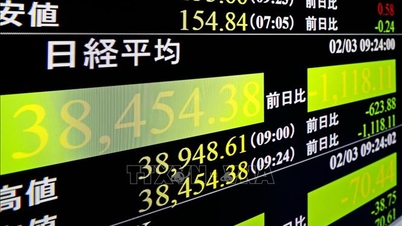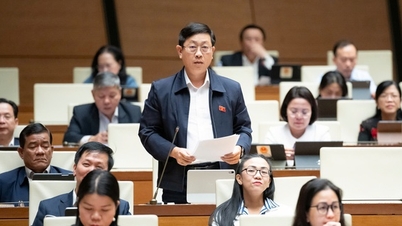
Customers choose to buy goods at a supermarket in London, UK. Photo: AFP/TTXVN
The UK government aims to raise around £30 billion in additional tax revenue between 2030 and 2031. To do that, the UK will keep the current personal income tax rate unchanged for the period between 2028 and 2031, a move that contradicts the Labour Party's previous pledge to reduce the tax burden on British workers.
In addition, the British government will also increase taxes on the online gambling industry and high-value real estate, as well as impose mileage charges on electric vehicle users.
Analysts say some key measures will only come into effect from 2028, near the end of the current Parliament's term and will allow Labour to reverse some tax rises if the economy grows more strongly than forecast.
In addition to increasing revenue, British Finance Minister Rachel Reeves also announced a multi-billion pound spending package to support people, such as increasing the minimum wage and pensions above the inflation rate; reducing energy bills; maintaining train fares and prescription fees; shortening waiting times for medical treatment at the National Health Service (NHS); promoting youth employment; supporting retail and service businesses; accelerating housing construction and upgrading infrastructure.
The budget was announced in the context of the UK economy facing many difficulties with growth expected to slow down in the period 2026 - 2029, budget deficit up to nearly 5% of Gross Domestic Product (GDP), inflation and unemployment rising.
However, the policy of tightening fiscal discipline was positively received by the market, reflected in the increase in the value of the pound against the USD and the Euro, while government bond yields decreased slightly.
Source: https://vtv.vn/anh-dat-muc-tieu-thu-them-30-ty-bang-tu-thue-100251128064156931.htm





![[Photo] President Luong Cuong attends the 50th Anniversary of Laos National Day](/_next/image?url=https%3A%2F%2Fvphoto.vietnam.vn%2Fthumb%2F1200x675%2Fvietnam%2Fresource%2FIMAGE%2F2025%2F11%2F27%2F1764225638930_ndo_br_1-jpg.webp&w=3840&q=75)

![[Photo] Prime Minister Pham Minh Chinh chairs the 15th meeting of the Central Emulation and Reward Council](/_next/image?url=https%3A%2F%2Fvphoto.vietnam.vn%2Fthumb%2F1200x675%2Fvietnam%2Fresource%2FIMAGE%2F2025%2F11%2F27%2F1764245150205_dsc-1922-jpg.webp&w=3840&q=75)






































































































Comment (0)